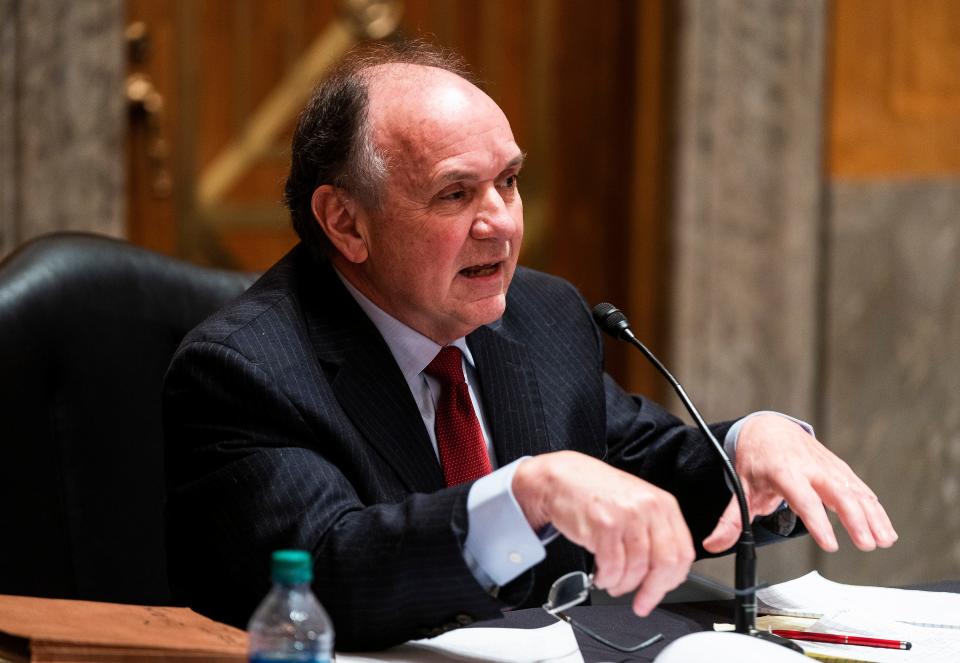Judge schedules trial in lawsuit against Wisconsin's fake electors for weeks before 2024 presidential election
MADISON – A trial in a Wisconsin lawsuit over the actions of 10 Republicans who posed as electors for Donald Trump in 2020 despite his election loss will take place just weeks before the next presidential election.
Dane County Judge Frank Remington set the trial for September 2024, just before Democrats and Republicans must submit lists of electors to the Wisconsin Elections Commission.
Two of Wisconsin's presidential electors filed the lawsuit last year seeking to fine the group of Wisconsin Republicans who posed as members of the Electoral College after Trump lost to Joe Biden.
The Democrats who brought the lawsuit in Dane County Circuit Court are also seeking to punish two attorneys who worked on the effort. They want a judge to award all involved up to $200,000 apiece in damages to ensure the losing side in future elections doesn't file official-looking paperwork with Congress claiming to be the winner.
The lawsuit asks a judge to find the Republicans engaged in a conspiracy aimed at defrauding voters and bar the participants from becoming electors in the future. The filing argues the Republicans helped fuel the Jan. 6, 2021, attack on the U.S. Capitol, when a pro-Trump mob tried to prevent Congress from finalizing Biden's victory.
It argues the fake electors and the attorneys violated laws that determine who can participate in Electoral College meetings and bar people from acting as if they hold public offices they don’t actually hold. It contends the false electors illegally interfered with official proceedings, counterfeited public records, defrauded the public and engaged in a conspiracy to try to get the wrong electors recognized by Congress.
"Defendants’ actions helped lay the foundation for a nationwide scheme to override the results of the 2020 election, thereby setting an anti-democratic precedent that jeopardizes all future elections inside and outside the State," attorney Jeffrey Mandell wrote in the complaint.
Republican Party of Wisconsin officials called the lawsuit frivolous at the time it was filed.
"This frivolous lawsuit from a liberal group is yet another Democrat attempt to resurrect a baseless story from two years ago," then-chairman Paul Farrow said in a statement in March 2022. "Even the Wisconsin Elections Commission voted unanimously to not sanction anyone. Democrats have tried to use this event to distract from their abysmal record on election reform."

Among the fake electors being sued is Bob Spindell, who also serves on the state Elections Commission.
Biden beat Trump by about 21,000 votes in Wisconsin. Trump sought recounts in Dane and Milwaukee counties, which confirmed Biden's win. Trump sued and the state Supreme Court upheld the results on a 4-3 vote on Dec. 14, 2020.
Less than an hour later, Democrats met in the state Capitol to cast the state's 10 electoral votes for Biden.
At the same time, the fake electors gathered in another part of the Capitol to fill out paperwork claiming Trump had won. They submitted their filings to Congress, the National Archives, a federal judge and then-Wisconsin Secretary of State Doug La Follette.
At the time, the fake electors said they held the meeting to ensure the state's electoral votes were cast for Trump if a court later determined he was the true winner of the state.
The plan was spelled out after the election by attorney Kenneth Chesebro in a memo dated Nov. 18, 2020 — the same day Trump asked for recounts in Dane and Milwaukee counties.

Chesebro sent the memo to Jim Troupis, the attorney who oversaw Trump's post-election legal strategy in Wisconsin. It's unclear whether Chesebro worked for Trump or someone else. Chesebro sent a second memo on the matter on Dec. 9, 2020, after state officials certified Biden as the victor in Wisconsin.
The filings from the fake electors in Wisconsin and elsewhere helped Trump and his allies argue the results were in dispute as they tried to prevent Congress from finalizing them.
The U.S. Department of Justice has said it is looking into Republicans who claimed to be electors in states Trump lost.
The U.S. House committee investigating the Jan. 6 account subpoenaed would-be electors from around the country, including two from Wisconsin. The fake electors met with investigators privately.
As in Wisconsin, Republicans in Arizona, Georgia, Michigan and Nevada signed documents purporting to be electors. Republicans in New Mexico and Pennsylvania filled out paperwork saying they should be considered electors if courts found Trump had won their states.
Molly Beck can be reached at molly.beck@jrn.com.
Our subscribers make this reporting possible. Please consider supporting local journalism by subscribing to the Journal Sentinel at jsonline.com/deal.
DOWNLOAD THE APP: Get the latest news, sports and more
This article originally appeared on Milwaukee Journal Sentinel: Wisconsin fake electors trial set to start weeks before 2024 election

